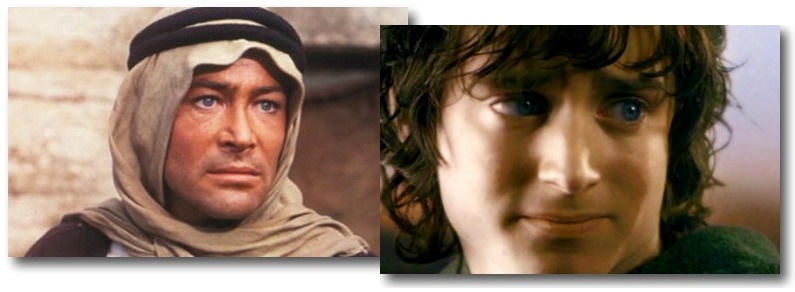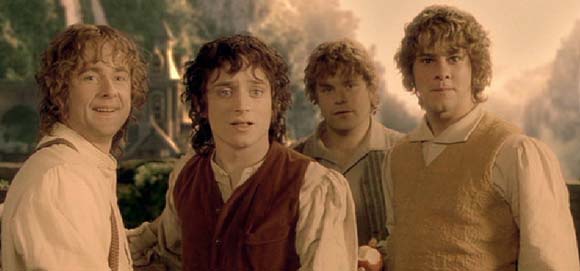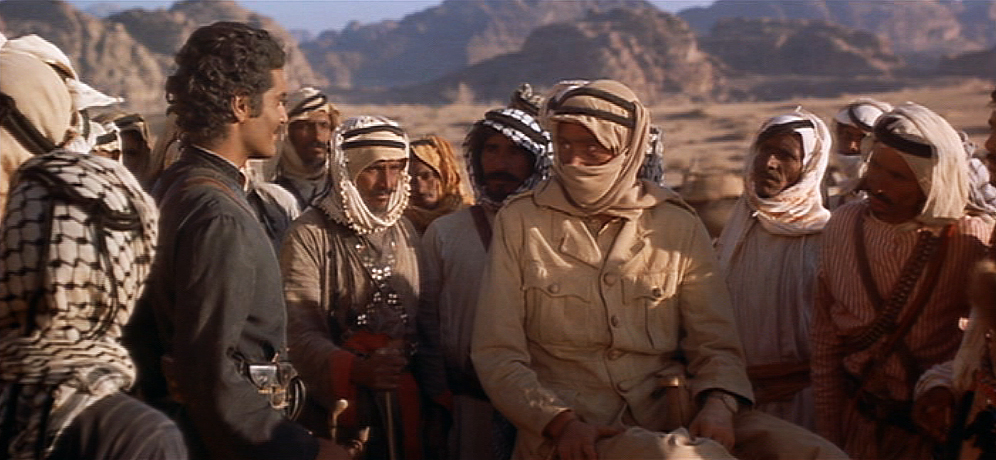Distant Relatives: Lawrence of Arabia and The Lord of the Rings
 Friday, October 28, 2011 at 11:03AM
Friday, October 28, 2011 at 11:03AM Robert here w/ Distant Relatives, exploring the connections between one classic and one contemporary film.

Heroes, Real and Imagined
"The Lord of the Rings" was originally published in 1954, eight years before the release of the film Lawrence of Arabia. Technically it came first. Then again T.E. Lawrence rode through Arabia in 1916 besting J.R.R. Tolkien's adventure by 38 years. Really, if you wanted to continue down this path you'd have to go back invention of the epic hero tale itself. This is why these films make for a fascinating fit. They are, arguably, the greatest cinematic epic based in realty and the greatest cinematic epic based in fantasy. They have similarities as a direct reflection of their status as epic hero storytelling, and similarities so specific they transcend that label. Then there are the differences. You won't see me use the term "reluctant hero" here because Lawrence, though he may get there eventually, starts off expecting his adventures to be "fun." Frodo not so much. And it's safe to say without a spoiler warning, that you're aware that Lawrence didn't do anything in Arabia that saved the world, even on a small scale, yet that's just the mission that Frodo is tasked with. Lawrence's mission is a little more vague, creating chaos, trotting from one quickly conceived battle to another, eventually perhaps uniting the Arabs. Quite a ways from Frodo's to destroy the ring of power, save the world. But both are attempting to bring some sort of perceived restoration to a land and both are at the whim of a towering ancient history, of which they will soon become a part.
Both stories start off similarly enough with a singular character chosen for their je ne sais quoi and sent off to a far away place. Although that je ne sais quoi may be some combination of strength, resolve, and perhaps to their detriment, innocence. In other words, they both understand, or will understand that the trick to standing the fire is "Not minding that it hurts." Immediately there is danger, harsh foreign landscape and people, separated by clan or by race, defined by differences; the Bedouin, the Howeitat, the Dwarfs, the Elves forced to work together, united for the purpose of our hero. Following this is the hardship of travel, the escalation of war, battles by name (Aqaba, Helm's Deep, Damascus, Gondor), and an inhuman enemy, actual non-human Uruk-hai for Frodo, and for Lawrence, the Turks represented only briefly by the Bey of Daara who tortures, though not much more than we've seen of some of our heroes. Sometimes the pure evil of fantasy is less unsettling than the complexity of reality. Finally there is a resolution, an ending, or a semi-ending. But I'd argue that in both cases the resolution is only partially relevant.

Into the Darkness
We already know that Frodo will achieve much and Lawrence will achieve little. Their journeys foresee those ends quite quickly. What's more important is how those journeys will alter them, and not for the better. The term "epic hero tale" conjures up images of bravery and glory, but Frodo and Lawrence experience a whirlwind of darkness, fear, and corruption. Of course, the one ring is a symbol of power and with great power comes great corruptibility. Frodo falls deeper and deeper into darkness until he's won over by Gollum. Lawrence too lets his building grandeur fill his own head. But there's an even greater darkness at play. Early in the film, after Lawrence kills a man he laments, not that he may have to do it again, but that he enjoyed it. In so many ways, these men are the keepers of life and death. Victories slowly come filled less with jubilation and more with relief that the end is one step closer. Meanwhile the old men who run the world sit at tables and make declarations and have no idea just how little power they have, and how much belongs to one little person.
Epic hero tales that give us everyman protagonists, exotic locales, and thickening drama are a staple of storytelling. Here, even at opposite ends of the fantasy/reality spectrum we find two films that meet all the criteria for a quality epic. Did T.E. Lawrence's story make for a great film because it naturally met all the criteria of the genre? Because it seemed to be scripted? Is The Lord of the Rings such a beloved tale because despite the fantasy, the emotions, the personalities and the conflicts are so close to what we see in reality? These films cross over each other and back again and still are only bookends for cinema's rich collection of epics whether fantasy or reality.

Other Cinematic Relatives: Star Wars (1977-1983), Princess Mononoke (1997), Ben-Hur (1959), and The Harry Potter Series



Reader Comments (4)
Elijah Wood right next to Peter O'Toole. That's fodder for my nightmares.
Epic hero tales that give us everyman protagonists? This doesn't seem right for either of them, cause an everyman protagonist is nowhere to be seen.
Lawrence of Arabia is a character study of a man oscillating between genius and madness, and according to some historians, this actually does come close to the real life Lawrence.
The Travesty of The Lord of the Rings is an action adventure whose protagonist is a flat-out weakling whereas Tolkien's Frodo is something very special. Either way, none of them is an everyman. I'd also say that Aragorn is The Lord of the Ring's epic hero. Most literary scholars identify Frodo as a fairy tale hero.
In any case, it's not "fun" to see one of the greatest Best Picture winners paired with one of the most embarrassing. It does underline the Academy's duality, though.
Perhaps I should have said "started out as everyman..." Personally I had no trouble relating to Lawrence and Frodo at the outset, which is what made my investment in their adventures so important. Though by the end obviously they've clearly revealed themselves to transcend the "everyman" label.
Thomas Edward Lawrence certainly was a highly gifted man, and Book Frodo never was an average person, but as far as the movies go, "started out as everyman" does sound good. However, both characters quickly reveal that they are anything but everymen. Lawrence shows that he's one for desert warfare during his early scenes with Tafas, and the caricature of Frodo already breaks down during his first encounter with a Black Rider.
Now I am picturing Peter O'Toole as "Gandalf" !